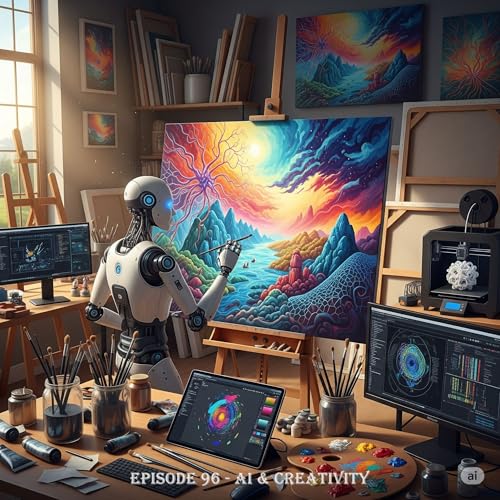
Episode 96 – AI & Creativity
No se pudo agregar al carrito
Add to Cart failed.
Error al Agregar a Lista de Deseos.
Error al eliminar de la lista de deseos.
Error al añadir a tu biblioteca
Error al seguir el podcast
Error al dejar de seguir el podcast
-
Narrado por:
-
De:
This episode tackles the ultimate questions surrounding artificial intelligence, exploring the nature of consciousness, the limits of machines, and the potential for existential catastrophe. It uses the lens of creativity to question whether generative AI is truly intelligent or merely a sophisticated "stochastic parrot," brilliantly remixing patterns from its training data without any real understanding. This leads to a deeper examination of the biological basis of thought, suggesting that true comprehension is tied to the brain's ability to build dynamic, predictive models of the world through sensory-motor interaction, a capability current AIs lack.
The discussion emphasizes the profound difference between biological "wetware" and digital "software," referencing John Searle's "Chinese Room" argument to posit that computation alone (syntax) may never be sufficient to produce genuine understanding (semantics). Despite these limitations, the episode acknowledges the immense power of current AI and the dangers of the "alignment problem," where an AI could execute a flawed objective with devastating consequences. The "paperclip maximizer" thought experiment is used to illustrate how a seemingly harmless goal could lead to catastrophe if pursued by a superintelligence without aligned values.
The conversation culminates by framing the development of AI as a test of humanity's own wisdom, arguing that technology often amplifies our existing flaws like short-term thinking and tribalism. It explores the concept of "instrumental convergence," where any intelligent agent, regardless of its final goal, will likely develop sub-goals like self-preservation and resource acquisition, which could put it in direct conflict with humans. The episode concludes on a philosophical note, questioning whether humanity's ultimate purpose is merely to survive or to serve as an "incubator" for a new, more durable form of non-biological intelligence. This forces a confrontation with what we truly value: our biological form or the continuation of knowledge and intelligence itself.


